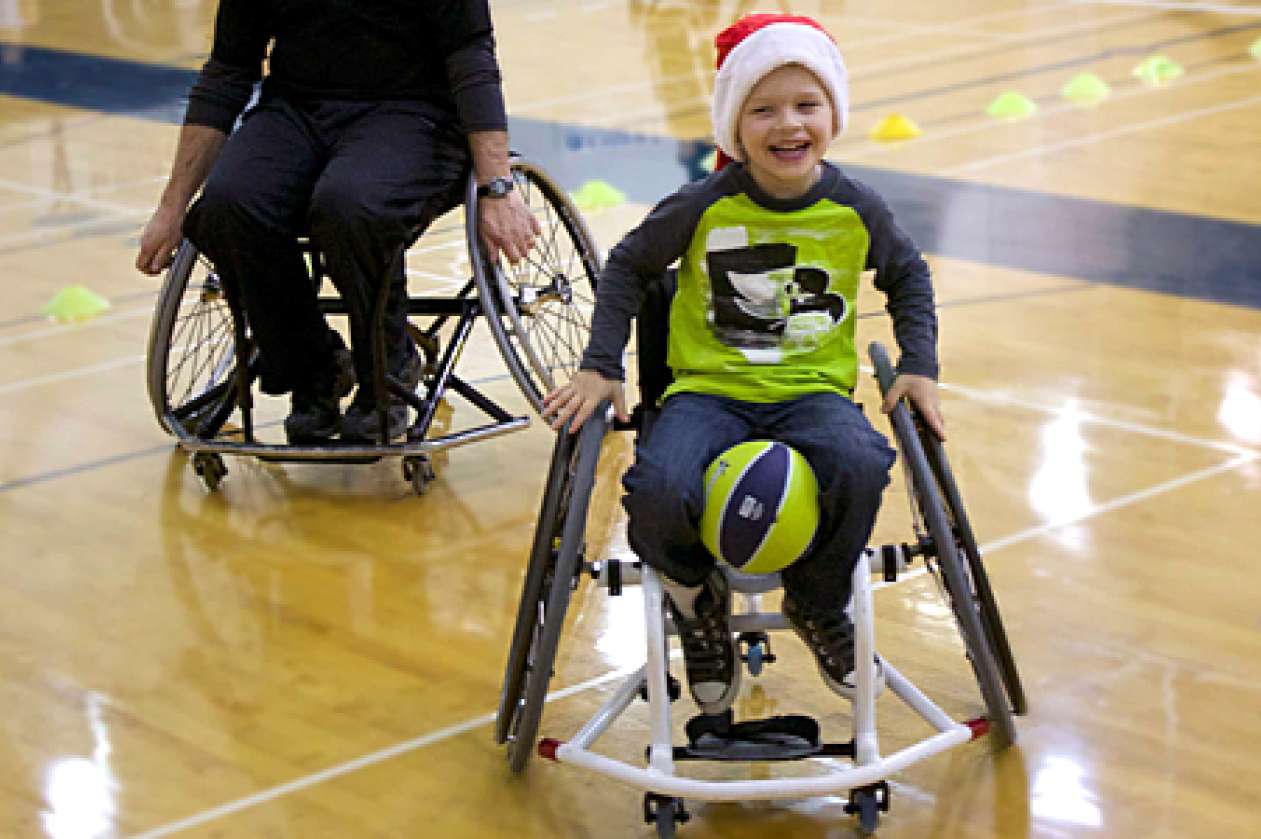
Let’s Play helps kids in wheelchairs to develop physical literacy
Children in wheelchairs are getting their own special brand of physical literacy programming in B.C.
An organization called Let’s Play is helping kids with physical disabilities and mobility impairments to develop the fundamental movement skills and confidence to become active for life.
Directed primarily at kids ages 8 years and younger, Let’s Play works with schools across the province to provide kids with specially-designed sport wheelchairs to help them get active. At the same time, Let’s Play provides teachers, instructors, and parents with training in best practices to build inclusive physical activity programs that allow kids with mobility impairments to play alongside their able-bodied peers. Let’s Play even helps to supply adapted sports equipment.
One of the Let’s Play program facilitators, Marni Abbott-Peter, is a three-time Paralympic gold medalist in wheelchair basketball. She has obvious sympathies with kids who are challenged with mobility issues.
She enjoys helping kids to discover fun possibilities in adapted physical activity, as well as health and independence through improved skills and fitness.
“That’s the thing that we really try to promote,” says Abbott-Peter. “It’s just a different way of exercising and the wheelchair is a piece of sports equipment, just like a hockey stick or a bike.”
 A major focus of the Let’s Play program is inclusion. A sport wheelchair gives kids with a mobility impairment the freedom to join their classmates in physical activity and play. At the same time, the program also encourages their able-bodied peers to try the wheelchairs during activities so they can learn about the challenges that their friends face every day.
A major focus of the Let’s Play program is inclusion. A sport wheelchair gives kids with a mobility impairment the freedom to join their classmates in physical activity and play. At the same time, the program also encourages their able-bodied peers to try the wheelchairs during activities so they can learn about the challenges that their friends face every day.
Let’s Play owns over 100 sport wheelchairs, and they loan dozens of them to different B.C. elementary schools each year on a rotating basis. This gives all of the kids — with and without mobility impairments — the chance to have fun trying adapted games such as wheelchair basketball.
The Let’s Play program specifically targets kids with physical disabilities and mobility challenges, as opposed to cognitive or sensory disabilities. Some kids may be paraplegics or amputees, while others may have spina bifida or higher classifications of cerebral palsy.
“The kids represent a real variety of physical disabilities,” explains Abbott-Peter. “We’re really focusing on kids with physical disabilities that have some upper body strength and are able to push the chair.”
Abbott-Peter says that schools and teachers across the province have embraced the Let’s Play program. As for parents of children with mobility impairments, some are more receptive than others.
“A lot of parents are focused on the medical side of things when their kids are small,” she says. “They tend to focus on the physiotherapy and keeping them ambulatory and those kinds of things, and they sort of forget that kids need to play as well.
“I like helping to change attitudes about what a wheelchair represents. I like getting parents and teachers on board with the idea that these kids need to play and have fun, and just be able to enjoy themselves like any other child.
“It’s an individual education process. But because I’m disabled myself, and I’m a daily wheelchair user, I think parents are able to identify with me a bit more. I help them to see what their child is capable of.”
Let’s Play originally started as a partnership between the Rick Hansen Institute, the B.C. provincial government, and the B.C. Wheelchair Basketball Society. Since then, Let’s Play has operated on a grant-to-grant basis under the leadership of B.C. Wheelchair Basketball with recent funding coming from the Vancouver Foundation, Telus, and the Canadian Paralympic Committee.
School programs have run in communities as disparate as greater Vancouver, Kamloops, Powell River, Prince George, Fort St. John, Kitimat, and Terrace. In some instances, Let’s Play has worked in partnership with local agencies and organizations, such the Pacific Institute for Sport Excellence (PISE) in Victoria, Sunny Hill Health Centre in Vancouver, and the Vancouver Parks Board. Most recently, Let’s Play has partnered with Participaction and their Bring Back Play Funmobile to reach out to some of the most remote regions of the province.
The ultimate goal is to help kids develop a lifelong love of physical activity and the skills to do it. You can learn more about the Let’s Play program by visiting the organization website. To ask about bringing the Let’s Play program to your school or community, you can inquire by emailing [email protected], or you can call (604) 333-3530 to speak directly with a program facilitator.





